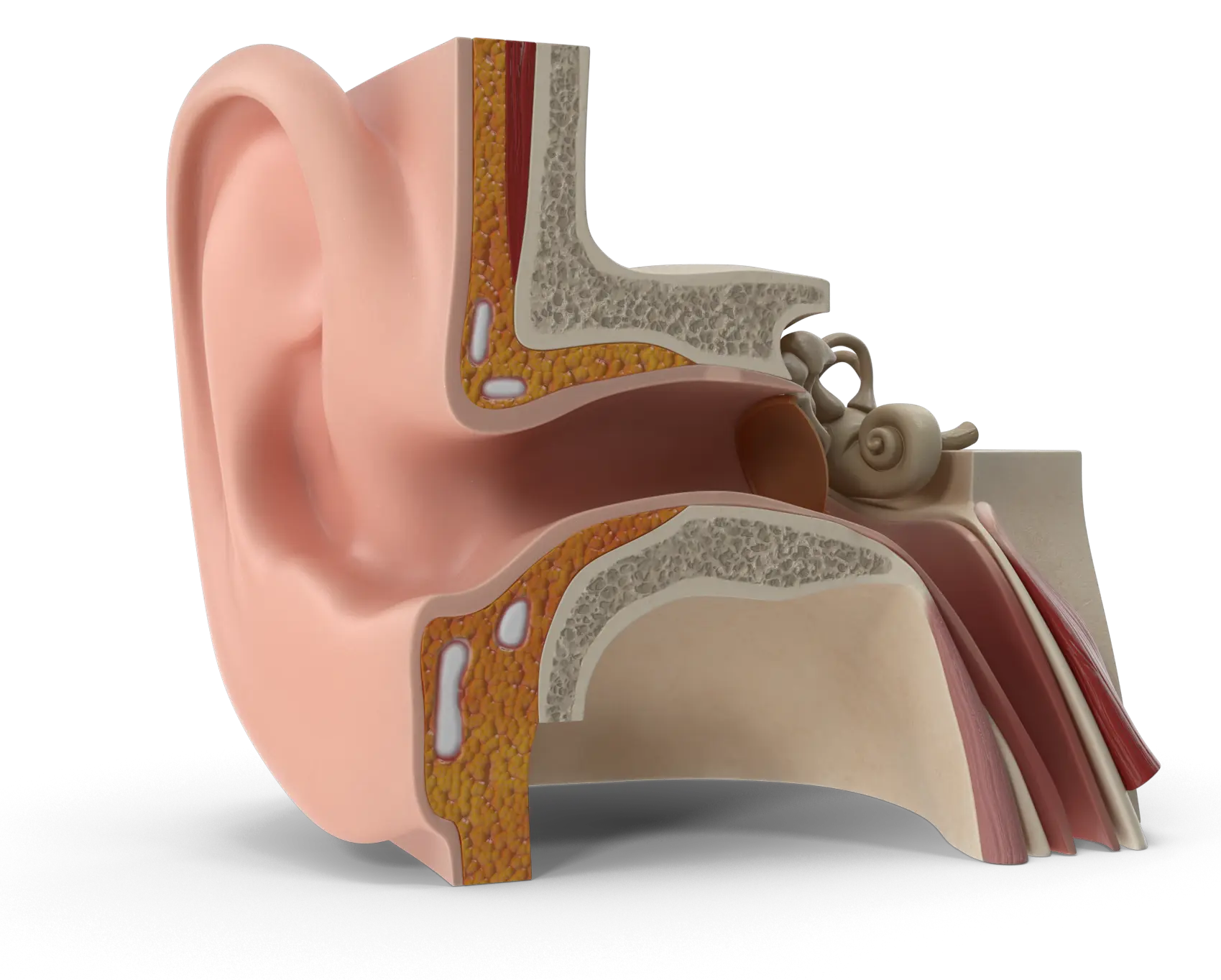Tinnitus Clinic Sheffield

Tinnitus Treatment in Sheffield
Should you require treatment for your tinnitus, Byrom provides a range of tinnitus treatment from his Sheffield based Tinnitus Clinic, helping those who require it across Sheffield and South Yorkshire. Peter holds a tinnitus clinic at Thornbury Hospital, and for those who find difficulty travelling, will provide a home visit in South Yorkshire. Peter will conduct a thorough audiological assessment for you and also find out just how much of a problem the tinnitus is. Peter will go through all the results explaining what they mean and make recommendations applicable to your needs. Peter has had training in cognitive behavioural therapy and relaxation techniques as well as being a registered hearing aid dispenser. It is rare that he is unable to provide any relief.
What is tinnitus?
Tinnitus is the perception of noise or a ringing in the ears and it is a common problem, tinnitus can affect around 15 to 20 percent of people. Tinnitus itself is not actually the condition itself it is a symptom of an underlying condition, this includes age-related hearing loss, ear injuries or a circulatory system disorder. While it does affect people, tinnitus isn’t seen as a sign of something serious, although it can worsen with age and for many people, tinnitus can improve with the correct treatment. Treating the identified underlying cause will sometimes help, it’s also recommended to consider treatments that reduce or mask the noise, making tinnitus less noticeable.


Our Sheffield Tinnitus Clinic
If you are being driven to distraction by head noise such as tinnitus, it is likely that Peter Byrom, an Audiologist specialising in tinnitus, will be able to help you.
His CV includes:
- MSc in Advanced Practice from Leeds University where his research project involved a study of Tinnitus patients, with his results presented in a paper to the International Tinnitus Seminar in Berlin in 2014.
- Previous membership of the British Tinnitus Association Professional Advisory Committee for five years.
- Previous clinical lead position in the Ear Care and Audiology Department at Rotherham NHS Foundation Trust for seven years with tinnitus as a specialist field.
- Membership of the British Society of Audiology Specialist Interest Group for Tinnitus and Hyperacusis.
- Vast experience with easily over a thousand tinnitus cases assessed and treated.
What Causes Tinnitus?
While we can define the exact answer to the main cause of tinnitus, we do know that it is not a disease or an illness. It tends to be agreed that tinnitus will result from some type of change, either mental or physical, and isn’t necessarily related to hearing. When we hear, the sound travels into the ear and then our hearing nerves take the signals to the brain. The brain will then be responsible for putting it all together and making sense of the sound, because the ears don’t know exactly what is important and what’s not important, they will send a lot of information to the brain. Sometimes this can be too much information for us to process, so the brain will filter out a lot of unnecessary ‘activity’ and background sound, this includes things like clocks ticking or traffic noise. Should there be a change in the system, like hearing loss or ear infection, the amount of information being sent to the brain will change, the brain will then respond to this change in levels and try to get more information from the ear, and the extra information you may get is the sound we call tinnitus. Tinnitus is therefore actually in the brain and concerned with brain activity and not actually in the ear itself. It is generally accepted that it isn’t only a change in the ear that can result in tinnitus, but it can also be due to a change in stress levels, whether it's a period of significant stress, a change in life circumstances or general wellbeing. People tend to say that they are aware of noises in the ears when they have a cold, an ear infection or wax blocking the ear. In some cases people become aware of tinnitus following a really stressful event and once they have become aware of it, they may notice it more and more, but this will usually fade once all of these things have passed. Some people continue to notice the tinnitus and also after an infection has cleared up, luckily, tinnitus is rarely an indication of a serious disorder and a specialist will be able to check this for you. If you think that you are experiencing tinnitus, contact Byrom Audiology and book an appointment at his tinnitus clinic today.

The Symptoms of Tinnitus
Tinnitus is the sensation of hearing sounds when no external sound is present, the main symptoms may include these types of phantom noises in your ears:
- Ringing
- Buzzing
- Roaring
- Clicking
- Hissing
- Humming
While the phantom noise may vary in pitch from low to high, and you may hear it in one or both ears, sometimes the sound can be so loud that it can interfere with your ability to concentrate or hear external sounds. Tinnitus may be present all the time, or it may come and go frequently.
Types of Tinnitus
There tends to be two types of tinnitus, this includes subjective and objective tinnitus: Subjective tinnitus is tinnitus that only you can hear, it is the most common type of tinnitus and it can be caused by ear problems in your outer, middle or inner ear. Tinnitus can also be caused by problems from the hearing (auditory) nerves or the part of your brain that interprets nerve signals as sound and auditory pathways. Objective tinnitus is tinnitus that a doctor or specialist will also be able to hear when they provide an examination. It’s a rare type of tinnitus that can be caused by a blood vessel problem, a middle ear bone condition or muscle contractions.

Will the Tinnitus improve?
When you first experience tinnitus and its effects, you may naturally be worried and also very aware of this new sound. As humans we constantly monitor our bodies and if anything changes, we become aware of the changes, hearing tinnitus for the first time can be quite frightening and you may think it means that something is wrong with you, or that it might change your life. There’s no need to worry though, while it is a new sensation, you will need to give yourself time to adapt to it. The majority of people find that their tinnitus does seem to settle down after they first experience it, even without doing anything in particular. Initially, it may seem to be really loud but then after a while, you may stop noticing it as much. Tinnitus can be much the same, it can also be more noticeable but you will gradually notice it less than you did the first time and so on. Often tinnitus perception is reduced to a very low level or even to the extent it isn’t perceived at all. Although there are no guarantees, the results can make a great deal of difference to people’s everyday lives. We recommend that one of the most important things to do is to keep doing the things that you love and enjoy. If you start living your life differently to account for the tinnitus, it’s just going to become more of a problem, while you may need to do things differently, it’s important that you and your wellbeing is taken care of. We offer appointments during the day, evenings, and at weekends. Your assessment will last up to 90 minutes and cost £175.00
-
Will a hearing aid restore my hearing back to normal?
While hearing aids can significantly improve the clarity of sounds and help you hear better, they don’t restore your hearing to normal. Hearing aids are designed to amplify sounds and enhance your ability to hear in different environments, but they can't "fix" hearing loss completely. They offer one of the best chances of clearer hearing, even with some level of loss, but the experience may not be exactly the same as natural hearing. With the right hearing aids, you can greatly improve your quality of life and communication, even with hearing challenges.
-
Why choose Byrom Audiology for wax removal?
Comprehensive Range of Removal Techniques
We offer irrigation, microsuction and manual ear wax removal – unlike many providers who only offer one method. This allows us to tailor the treatment to each individual:- Microsuction is essential for patients with a perforated eardrum.
- Children and adults may have personal preferences based on comfort or previous experiences.
Advanced Diagnostic Equipment
We use a video otoscope so patients can view their ear canal before and after treatment.- Enables clear communication and peace of mind.
- We can provide immediate onward referral to NHS or private specialists if required – no need to visit a GP.
- Our high-quality microsuction equipment is effective even in cases involving narrow ear canals or impacted wax.
Inclusive Follow-Up Appointments
- If complete removal is not possible during the initial appointment, we offer a follow-up to ensure thorough treatment.
- This may include further softening of wax with oil or reassessment of any underlying conditions such as infections or lesions.
-
Where can I have my hearing tested?
At Byrom Audiology, we offer hearing tests at two convenient locations: Dore and Thornbury. Both clinics are equipped with state-of-the-art audiology equipment, ensuring a comprehensive and accurate assessment of your hearing and overall aural health. You can choose from NHS or private options, depending on your preferences and needs. Our team is here to guide you through every step of the process, providing expert advice and care.
-
Where can I get a hearing test near me?
At Byrom Audiology, we offer hearing tests at our two clinics in Dore and Thornbury. If you prefer an NHS service, you may have to wait for an appointment, but we strive to provide swift, accessible services for those who want to get their hearing tested sooner. Our team is always available to help you arrange an appointment at your convenience.
-
What does a hearing test show?
A hearing test can provide valuable information about the frequency (pitch) and intensity of sounds that you can hear. It can identify the degree of hearing loss in each ear, pinpointing which ear may be worse and whether you need hearing aids. Additionally, the test can detect different ear conditions such as ear infections or blockages, which may affect your hearing. This comprehensive assessment helps us offer the best solution tailored to your specific needs.
-
How often should I have my hearing tested?
We recommend having your hearing tested annually, especially if you are aware of some degree of hearing loss or if you are over the age of 50. Regular check-ups help to monitor any changes in your hearing and ensure that you get the appropriate support and treatment. Early detection of hearing loss can make a significant difference in managing your hearing health over time.
-
How much is a hearing test?
Our hearing tests are priced at £100. This cost includes a thorough assessment of your hearing and overall ear health. You’ll receive a full history evaluation, ear examination, pressure test, and hearing test, along with an explanation of your results. If necessary, we’ll discuss the next steps, such as a referral or the potential need for hearing aids.
-
How long does a hearing aid last for?
A hearing aid from Byrom Audiology is guaranteed for 5 years +, depending on the make and model, as well as how well it is cared for. Regular maintenance and occasional repairs can help extend the life of your hearing aids. At Byrom Audiology, we provide guidance on how to care for your devices and ensure they stay in optimal condition. We also offer a comprehensive 90-minute assessment where we provide you with tailored advice based on your specific hearing needs.
-
How do I know if I need a hearing aid?
If you’ve been struggling with background noise, feel like people are mumbling, or find it difficult to hear in places like restaurants or group conversations, it may be a sign that you have some level of hearing loss. Additionally, the onset of tinnitus (ringing or buzzing in the ears) can also be an indicator. If you notice any of these symptoms, it's a good idea to get a hearing test to understand the cause and explore the potential benefits of a hearing aid.
For Audiology in Sheffield Contact Byrom
When it comes to audiology in Sheffield or any of the surrounding areas in South Yorkshire, be sure to make Byrom your first port of call. We have years of experience in the industry and offer a full range of dedicated audiology and hearing services for patients. No matter what your hearing requirements might be, from wax removal, hearing tests to hearing problems and tinnitus, be sure to make us your first choice. Contact us today to book an appointment in local Sheffield.
Services
Our Clinics
-
Byrom Audiology
Thornbury Hospital
312 Fulwood Road
Sheffield S10 3BR -
Byrom Audiology
12 Causeway Head Road Dore
Sheffield S17 3DT
0114 419 1800 - support-team@peterbyrom.co.uk


